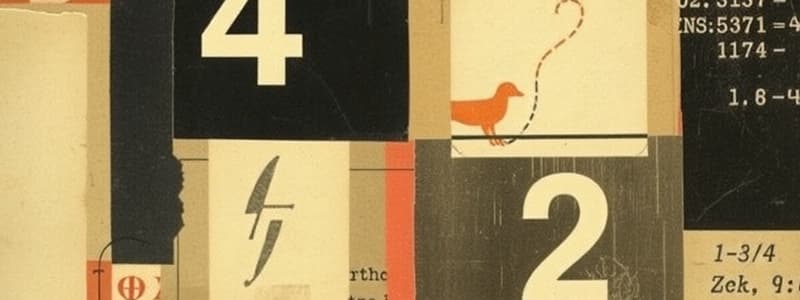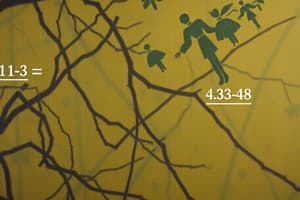Podcast
Questions and Answers
The process of calculating the total of two or more numbers is called ______.
The process of calculating the total of two or more numbers is called ______.
addition
The symbol for addition is represented by the ______ sign.
The symbol for addition is represented by the ______ sign.
plus
In addition, the order of numbers does not matter due to the ______ property.
In addition, the order of numbers does not matter due to the ______ property.
commutative
The process of finding the difference between numbers is known as ______.
The process of finding the difference between numbers is known as ______.
The symbol for subtraction is the ______ sign.
The symbol for subtraction is the ______ sign.
The identity property for subtraction states that a - 0 = ______.
The identity property for subtraction states that a - 0 = ______.
Addition and subtraction are said to have an ______ relationship because they are inverse operations.
Addition and subtraction are said to have an ______ relationship because they are inverse operations.
Flashcards are hidden until you start studying
Study Notes
Addition
- Definition: The process of calculating the total of two or more numbers or amounts.
- Symbol: Represented by the plus sign (+).
- Properties:
- Commutative Property: a + b = b + a (order does not matter)
- Associative Property: (a + b) + c = a + (b + c) (grouping does not matter)
- Identity Property: a + 0 = a (adding zero does not change the value)
- Examples:
- Basic: 2 + 3 = 5
- More complex: 15 + 27 = 42
Subtraction
- Definition: The process of finding the difference between numbers or amounts.
- Symbol: Represented by the minus sign (−).
- Properties:
- Non-Commutative: a - b ≠ b - a (order matters)
- Associative Property does not apply: (a - b) - c ≠ a - (b - c)
- Identity Property: a - 0 = a (subtracting zero does not change the value)
- Examples:
- Basic: 5 - 2 = 3
- More complex: 32 - 15 = 17
Key Concepts
- Inverse Relationship: Addition and subtraction are inverse operations.
- Applications: Used in everyday calculations, finance, and problem-solving.
- Mental Math Tips:
- For addition: Round numbers for easier mental calculations.
- For subtraction: Break down numbers into more manageable parts.
Addition
- Addition calculates the total of two or more numbers or amounts.
- It is symbolized by the plus sign (+).
- Commutative Property: Order of numbers in addition does not affect the sum (a + b = b + a).
- Associative Property: Grouping of numbers does not change the sum ((a + b) + c = a + (b + c)).
- Identity Property: Adding zero to a number does not change its value (a + 0 = a).
- Basic addition example: 2 + 3 equals 5.
- More complex example: 15 + 27 equals 42.
Subtraction
- Subtraction finds the difference between numbers or amounts.
- This operation is represented by the minus sign (−).
- Non-Commutative: Order is important in subtraction (a - b ≠ b - a).
- Associative Property does not apply: Different grouping yields different results ((a - b) - c ≠ a - (b - c)).
- Identity Property: Subtracting zero from a number does not change its value (a - 0 = a).
- Basic subtraction example: 5 - 2 equals 3.
- More complex example: 32 - 15 equals 17.
Key Concepts
- Addition and subtraction are inverse operations of each other.
- These operations are essential for everyday calculations, financial assessments, and problem-solving strategies.
- Mental Math Tips for Addition: Round numbers to simplify calculations.
- Mental Math Tips for Subtraction: Break down complex numbers into smaller, easier components for easier subtraction.
Studying That Suits You
Use AI to generate personalized quizzes and flashcards to suit your learning preferences.




